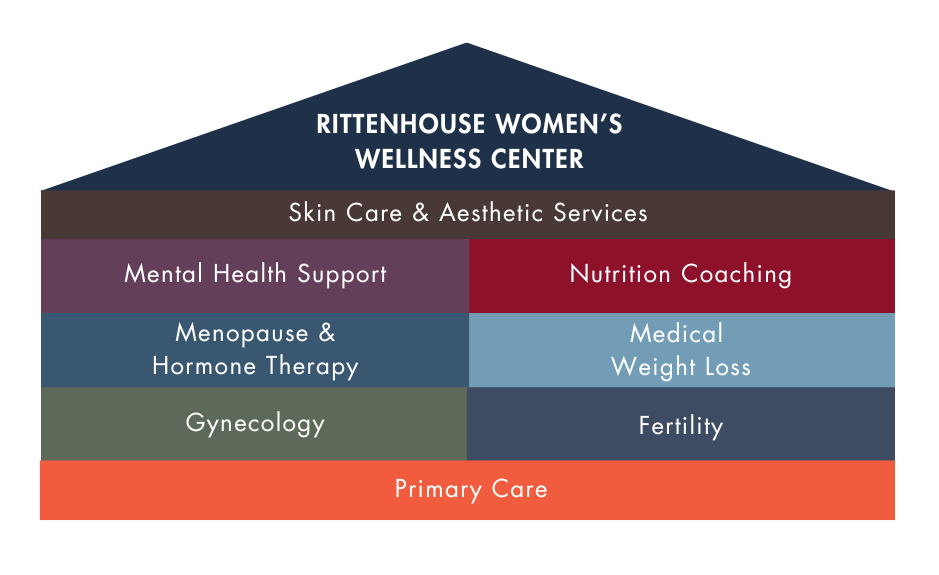At Rittenhouse Women’s Wellness Center, we believe that menopause isn’t something women should “just deal with.” It’s a major life transition that deserves thoughtful, personalized care — across body, mind, and spirit. That’s why we’ve built a comprehensive support system for women entering perimenopause, menopause, and beyond — from medical to mental health, weight management to sexual wellness.
This month, we’re proud to spotlight the unique ways we help women feel strong, balanced, and in control during menopause.
Certified Menopause Providers Who Truly Understand
Three of our core providers — Candace Williams, CRNP, Katie Olmstead, CRNP, and Leslie Saltzman, DO — are Certified Menopause Practitioners, which means they’ve received advanced training in the diagnosis, treatment, and management of menopause-related conditions.
This certification ensures that each patient receives:
- Evidence-based care rooted in the latest research
- A customized approach to hormone replacement therapy (HRT) — whether that’s estrogen, progesterone, testosterone, or non-hormonal alternatives
- A clear, safe, and thoughtful plan to manage symptoms like hot flashes, brain fog, mood changes, sleep disturbances, and sexual health concerns
These providers don’t just “treat symptoms” — they partner with you to reclaim your vitality and wellness.
HRT & BHRT Options — Because Every Body Is Different
At RWWC, we offer traditional Hormone Replacement Therapy (HRT) for women whose symptoms and lab work indicate that this may be helpful.
But we also recognize that not every woman wants (or responds to) the same treatment. That’s why we offer Bioidentical Hormone Replacement Therapy (BHRT) through our partner, the Better Health & Wellness Weight Loss Center (BHWWC) using the Biote® pellet method.
With Biote® BHRT:
- Small custom-compounded hormone pellets are inserted just beneath the skin
- They release a consistent dose of hormone over several months — avoiding the peaks and valleys of pills or creams
- Patients often report better energy, improved mood, better sleep, and increased libido
Weight Loss Support: GLP-1 Therapies for Menopausal Weight Gain
Let’s be honest: hormonal shifts make it harder to maintain a healthy weight — especially in midlife.
At BHWWC, we offer GLP-1 therapies (including compounded semaglutide and tirzepatide) as part of a supervised medical weight loss program for women experiencing menopause-related weight gain. These medications:
- Reduce appetite and food cravings
- Improve insulin resistance
- Help the body burn fat more efficiently
We pair these medications with regular monitoring and coaching to ensure long-term success.
Mental Health & Emotional Support
Menopause isn’t just physical. Many women experience:
- Mood swings
- Anxiety
- Sleep disturbances
- Brain fog
- Emotional shifts or grief around aging
That’s why we’re proud to have Dr. Courtney Liggera, a board-certified clinical psychologist, available at RWWC. She works with women one-on-one to help process and manage the emotional changes that can accompany this phase of life — with compassion, perspective, and actionable support.
Sexual Wellness: The O-Shot
One of the most under-discussed effects of menopause is its impact on sex and intimacy. Women often experience:
- Decreased libido
- Vaginal dryness or discomfort
- Urinary urgency or leakage
Dr. Gayln Faust, our board-certified gynecologist, offers the O-Shot® — an innovative, non-surgical treatment using your body’s own platelet-rich plasma (PRP) to stimulate vaginal tissue regeneration. Many women report:
- Increased sexual desire
- More comfortable intimacy
- Improved natural lubrication
- Reduced urinary incontinence
It’s just one more way we help women feel confident and connected.
A Message to Every Woman Navigating This Stage of Life
You don’t have to go through menopause alone — or in silence.
At Rittenhouse Women’s Wellness Center, we’re here to listen, support, and personalize your care. Whether it’s relief from physical symptoms, help managing weight, support for your emotional wellbeing, or finding joy in intimacy again — we have the expertise, compassion, and tools to help.
This is your time. Let’s make it vibrant.
Learn more or schedule an appointment at www.rwwc.com
Call us to speak with a patient coordinator: 215-735-7992
Located in the heart of Rittenhouse Square











